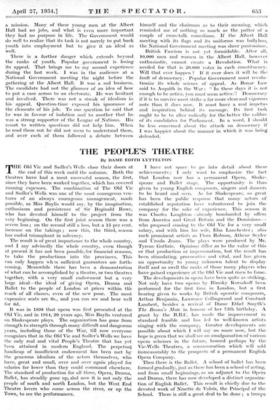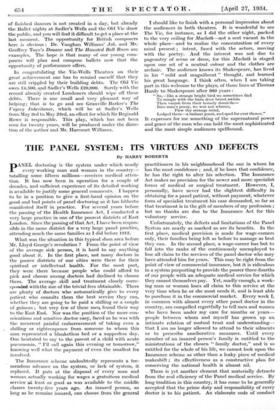THE PEOPLE'S THEATRE
By DAME EDITH LYTTELTON
THE Old Vic and Sadler's Wells close their doors at the end of this week until the autumn. Both the theatres have had a most successful season, the first, since they have been worked together, which has covered running expenses. The combination of The Old Vic and Sadler's Wells was one of the most courageous ven- tures of an always courageous management, made possible, as Miss Baylis would say, by the imagination, enthusiasm and persistence of Sir Reginald Rowe, who has devoted himself to the project from the very beginning. On the first joint season there was a severe loss ; on the second still a loss, but a 15 per cent. increase on the takings ; now this, the third, season has ended triumphant in solvency.
The result is of great importance to the whole country, and I say advisedly the whole country, even though at present it has not been possible, for financial reasons, to take the productions into the provinces. This can only happen when sufficient guarantees are forth- coming. Meanwhile there has been a demonstration of what can be accomplished by a theatre, or two theatres together, with a very small endowment but a very large ideal—the ideal of giving Opera, Drama and Ballet to the people of London at prices within the reach of all classes, even of the new poor. The most expensive seats are 6s., and you can see and hear well for 6d.
It was in 1898 that opera was first presented at the Old Vic, and in 1914, 20, years ago, Miss Baylis ventured on Shakespeare plays. The organization has gone from strength to strength through many difficult and dangerous years, including those of the War, till now everyone recognizes that in the Old Vic and Sadler's Wells we have the only real and vital People's Theatre that has yet been attained in modern England. The perpetual handicap of insufficient endowment has been met by the generous idealism of the actors themselves, who have, great and small, over and over again. played for salaries far lower than they could command elsewhere. The standard of production for all three, Opera, Drama, Ballet, has steadily gone up, and now it is not only the people of south and north London, but the West End Theatre lovers who come across the river, or up the Town, to see the performances. I have not space to go into detail about these achievements ; I only want to emphasize the fact that London now has a permanent Opera, Shake- speare and Ballet stage. The opportunity is thus given to young English composers, singers and dancers to be heard and seen. As for Shakespeare, so great has been the public response that many actors of established reputation have volunteered to join the company for the sake of experience. This season it was Charles Laughton—already bombarded by offers from America and Great Britain and the Dominions— who proposed coming to the Old Vie for a very small salary, and with him his wife, Elsa Lanchester ; also such prominent artists as Flora Robson, Athene Scyler and Ursula Jeans. The plays were produced by Mr. Tyrone Guthrie. Opinions differ as to the value of this or that production or impersonation, but the result has been stimulating, provocative and vital, and has given an opportunity to young unknown talent to display itself and so swell the ranks of those many players who have gained experience at the Old Vic and risen to fame. The developments in opera have been quite as striking. Not only have two operas by Rimsky Korsakoff been performed for the first time in London, but a first hearing given to works by British operatic composers, Arthur Benjamin, Lawrence Collingwood and Constant Lambert, besides a revival of Dame Ethel Smyth's The Bosun's Male in honour of her 75th birthday. A grant by the B.B.C. has made the improvement in standard feasible and has led to well-known artists singing with the company, Greater developments are possible about which I will say no more now, but the hope is green that we shall see an amalgamation of` various opera schemes in the future, housed perhaps by the Vie-Wells Theatres, a consummation which will add immeasurably, to the prospects of a permanent English Opera Company.
Then there is the Ballet. A school of ballet has been formed gradually, just as there has been a school of acting, and from small beginnings, as an adjunct to the Opera and Drama, there has now developed a distinct organiza- tion of English Ballet. This result is chiefly due to the devoted work of Ninette de Valois, the Principal of the School. There is still a great deal to be done ; a troupe of finished dancers is not created in a day, but already the Ballet nights at Sadler's. Wells and the Old Vic draw the public, and you will find it difficult to get a place at the last moment. The opportunity for British composers here is obvious : Dr. Vaughan Williams' Job, and Mr: Geoffrey Toye's Douane and The Haunted Bali Room are examples. The hope is that many of our young com- posers will plan and compose ballets now that the opportunity of performance offers.
In congratulating the Vic-Wells Theatres on their great achievement one has to remind oneself that they are still crippled by their building debts. The Old Vic owes £4,500, and Sadler's Wells £20,000. Surely with the record already created Londoners should wipe off these debts. There is one small and very pleasant way of helping; that is to go and see Granville Barker's The Voysey Inheritance, which will be at Sadler's Wells from May 3rd to May 23rd, an effort for which Sir Reginald Rowe is responsible. This play, which has not been seen for twenty years, will be produced under the direc- tion of the author and Mr. Harcourt Williams. I should like to finish with a persOnal impression about the audiences in both theatres. It is wonderful' to see The Vic, for instance, as I did the other night, packed to the very ceiling for Macbeth—not a seat vacant in the whole place—and to realize the concentration of every mind present ; intent, fused with the actors, moving' with the poetry. And the interest was not 'due 'to pageantry of scene or dress, for this -.21faebeth is staged' upon one set of a neutral colour and the clothes- are archaic. The audience knows its Shakespeare, has lived in his " mild and magnificent " thought, and learned his great language. I think often, when I am taking part in this welcome to the plays, of those lines of Thomas Hardy to Shakespeare after 300 years : " So, like a strange bright bird we sometimes find
To mingle with the barn door brood awhile
Then vanish from their homely domicile—
Into man's poesy, we wot not whence, Flew thy strange mind, Lodged there—a radiant guest, and sped for ever thence."
It expresses for me something of the supernatural power and grace of the man who can hold the most sophisticated and the most simple audiences spellbound.













































 Previous page
Previous page